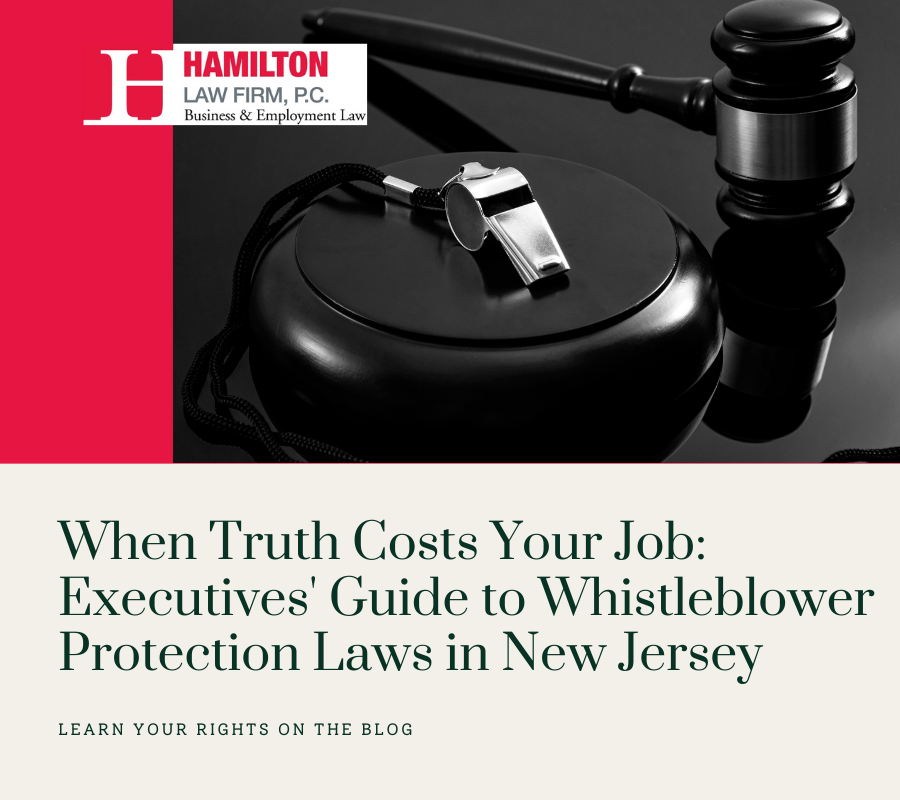The decision to whistle blow is rarely easy, and those who have the courage to bring unlawful activity to light should know that they have rights to protect their careers. In New Jersey, the Conscientious Employee Protection Act (CEPA) protects employees from workplace retaliation, including firing, demoting, or harassment. Executives must be fully aware of what risks whistleblowing carries, but they should be equally aware of what rights employees have to protect themselves and their careers.
If you feel that you have been retaliated against due to whistleblowing in NJ, contact a lawyer like Ayesha Hamilton at the Hamilton Law Firm to discuss your case.
What Is the Legal Definition of Whistleblowing?
The Conscientious Employee Protection Act (§ 34:19-1 et. seq.) defines whistleblowing as the act of disclosing or threatening to disclose information that one deems to be in violation of the law, a rule or regulation under the law, or a clear public policy that concerns public health or the safety or welfare of the environment. It also protects individuals who openly disagree with or refuse to participate in possibly illegal or fraudulent acts.
Whistleblowers disclose information that they believe is illegal or unethical in the name of the law. They may do this to protect others’ welfare, such as healthcare workers who feel laws are being violated at work, or manufacturing employees who believe regulations are not being followed.
CEPA helps employees of all levels maintain their jobs even if they disclose potentially incriminating information about their employers, whether that be specific individuals or the business as a whole.
The CEPA protects employees against various types of whistleblowing, including:
- Disclosing or threatening to disclose public information about an activity, practice, or internal policy that violates the law or regulations under law.
- (For healthcare workers) Reporting or threatening to report internal acts, policies, or practices that threaten the quality of patient care or safety.
- For employees in the pharmaceutical industry, reporting or threatening to report internal acts, policies of practices that relate to drug development, violation of FDA regulations or other drug safety rules or policies;
- Reporting acts of fraud, deception, or misrepresentation to shareholders, other employees, or the government, such as the Internal Revenue Service (IRS) or the Securities Exchange Commission (SEC) or other regulatory agencies.
- Objecting to or refusing to participate in behaviors that one feels is illegal, fraudulent, or criminal in nature, such as misrepresenting figures on financial records or disclosing confidential information without appropriate consent.
Can You Be Fired for Whistleblowing in New Jersey?
It is illegal for any business in New Jersey to fire someone for whistleblowing. The Conscientious Employee Protect Act strictly prohibits employers from taking any retaliatory action against a whistleblower, which includes terminating their employment agreement because they disclosed information to the authorities or the public.
What Your Employer Cannot Do if You Whistleblow
Executives who are concerned about losing their jobs due to whistleblowing can feel more confident knowing that New Jersey law is on their side. It is forbidden for an employer to take action against you due to whistleblowing (NJ Rev Stat § 34:19-3), including:
- Firing you without justifiable cause.
- Demoting you from your position.
- Withholding, reducing, or otherwise altering your pay.
- Passing you up for a promotion.
- Harassing you in the workplace.
Workplace harassment includes inappropriate or derogatory comments, sending malicious or harmful emails to you or about you to other employees, stating or implying that certain actions would lead to being fired, and discriminating against you.
Employee discrimination in New Jersey includes harassment, denial of employment, or terminating someone’s employment due to their sexual orientation, gender identity, relationship status, ancestry, age, race, creed, color, religion, or liability in the Armed Forces.
Know the Statute of Limits
Whistleblowers have one year after being affected by workplace retaliation to file a claim. During this time, an individual should consult with an experienced New Jersey employment attorney who can offer them appropriate counsel on whether their case classifies under the law.
Discrimination lawsuits against employers have a two-year statute of limitations from the date of adverse action under the New Jersey Law Against Discrimination (LAD). If you have been terminated and unfairly discriminated against, then you will have two years from the date of your last work day to file a claim against your employer.
The Anti-Corruption Whistleblower Program Aims to Fight Back Against Bribery and Corruption
The ACWP promotes the reporting of previously undisclosed criminal activity due to bribery or corrupt influence. There is a seven-year statute of limitations on crimes that fall under this program (N.J.S.A. 2C:27-1, et seq), which gives employees more time to come forward about bribery or criminal acts of corruption. Other indictable felonies have an average statute of limitations of five years.
It is important to reach out to a lawyer if you are a whistleblower. Protect your rights and speak with Ayesha Hamilton and the team of New Jersey employment lawyers at the Hamilton Law Firm in Princeton, NJ.


